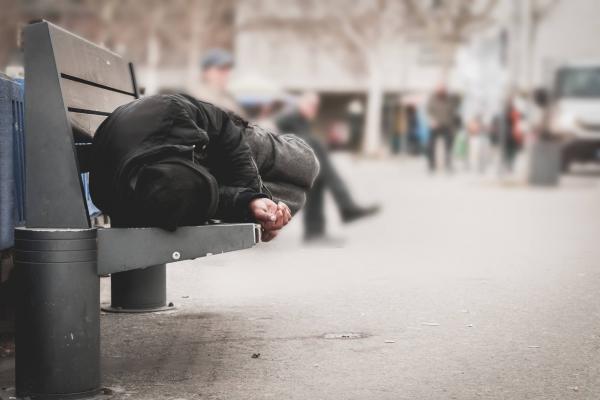IT IS CRUEL TO PUNISH people for their poverty, but at every level of government, poor people are targeted for unfair treatment under the law. There is perhaps no clearer example of this than the growing criminalization of homelessness in the United States.
The criminalization of homelessness refers to a broad set of policies that punish people for having no indoor homes, such as local laws that prohibit sleeping, sitting, or lying down in outdoor public space. Since 2006, the National Law Center on Homelessness and Poverty (the Law Center) has tracked the explosive growth of these laws, including a 143 percent increase in those that outlaw living in vehicles. This is often the last refuge for poor families, the elderly, and disabled people who have been priced out of the rental market. Today, for example, half of the U.S. cities surveyed restrict sleeping and sheltering oneself outdoors, even when there are no alternative places to go.
Rather than address the root causes of homelessness, such as low wages that have not kept pace with rapidly rising rents, these policies merely punish people for living outside. Meanwhile, people who are sleeping in tents, lying down on sidewalks, and living in their vehicles are doing so because they are too poor to afford other housing. To jail, ticket, or threaten them for it only makes the problem worse.
People brought to jail for living in public often cannot afford cash bail, so they frequently accept criminal convictions to temporarily regain their freedom. They are then released back to the same streets, with the same lack of options, but with new fees and criminal records that make it even more difficult to get into housing and out of public space. This cycle is expensive and wastes community resources that would be better invested in permanent housing and other proven cost-effective solutions to homelessness.
Moreover, it is unconstitutional. In a landmark decision in Martin v. City of Boise, the 9th Circuit—the highest federal court in the Western United States—ruled that it is unconstitutionally cruel under the Eighth Amendment to punish unhoused people for sleeping outside when they lack accessible housing and shelter. All human beings must rest, even if their only option is to sleep outside in a public space. To make that life-sustaining activity a crime is akin to punishing a person simply for being homeless.
Yet, despite the cruelty, ineffectiveness, and expense of policies criminalizing homelessness, they remain popular among lawmakers eager to give the appearance of doing “something”—even if it ultimately worsens the problem. The result is a grossly disproportionate number of homeless people arrested and booked into our overflowing jails. A recent investigative report by The Oregonian found that 50 percent of all arrests last year in Portland were of homeless people, who make up only 3 percent of the general Portland population.
‘We have no place for you’
The criminalization of homelessness is not limited to large urban centers. The problem can be more acute in smaller towns with fewer resources and less tolerance for visible signs of a changing community. Puyallup, Wash., with an area population of about 75,000 people, an hour south of Seattle, provides an excellent example. In effect, the city has made it illegal to be homeless within the city limits through a combination of camping and trespassing policies that outlaw living in public.
Moreover, the city enforces those laws in a way that sends a clear message to unhoused people in the city: “We have no place for you.” “You don’t belong here.” “Go away.” As a result, these people have been forced to leave town or hide from public view, often in traumatic and very unhealthy conditions, simply to find a place to sleep.
Worse yet, Puyallup has often challenged the few local church-supported homeless services and has even blamed the faith-based service community for the city’s worsening homeless crisis. This inhumane and ineffective response to homelessness earned Puyallup the dubious distinction of being named to the Hall of Shame in the Law Center’s 2016 national report on the growing criminalization of homelessness, “Housing Not Handcuffs.”
Using the power of law
This cruel treatment and banishment of destitute people is a significant civil and human rights issue that begs resolution in law. In 2015, Puyallup homeless advocates decided to use the law to force the city to begin treating homeless people with some dignity. Area city attorneys were convened for two meetings where they were advised that homeless people are part of our common humanity and therefore have common civil and human rights. A seminar was staged in the city park to educate the public regarding real solutions to local homelessness.
Following the seminar, six members of Puyallup’s faith-based service provider community protested Puyallup’s policies by sleeping in the city park. While the protesters were arguably engaged in expressive conduct protected under the First Amendment, they were arrested for violation of the city’s sleeping ban and sentenced to community service and probation. This protest led to additional legal action, including a federal lawsuit filed on behalf of six homeless people who—despite having no other place to go—were kicked out of the brushy areas where they were living and had their few belongings trashed in the process.
Members of Puyallup’s faith community also fought back against the city’s assault on its homeless drop-in center ministry, which the city claimed generates public health and safety issues. Advocates used the power of the law to keep this Christian ministry from being shut down by the city by arguing that Puyallup illegally infringed upon its free religious exercise.
Legal arguments of this type have a long history of success. In Fifth Avenue Presbyterian Church v. City of New York, for example, a church successfully prevented New York from dispersing homeless people who were invited to sleep on church property because the church’s use of its own property was found to be a protected religious activity. Similarly, in Big Hart Ministries Assn. Inc. v. City of Dallas, a religious ministry successfully challenged the enforcement of a Dallas ordinance restricting food sharing with poor and homeless people under the Texas Religious Freedom Restoration Act. Indeed, legal protections of religious expression are robust, positioning members of the faith community as excellent advocates for people whose rights are too often ignored.
‘Woe to those ...’
For Christians, the life of each homeless person is sacred. Each person is unique and innately precious, deserving of respect and basic resources that allow for healthy and safe living. God has created an earthly home for all of us, a place to dwell, belong, and do homemaking.
In the Hebrew Bible, social legislation was established to prevent poverty and homelessness, stop concentrated land ownership and monopolies, and allow people who had lost their land or housing to have it returned. When injustice was sanctioned by government, Isaiah could cry out “woe to those who make iniquitous decrees, who write oppressive statutes, who turn aside the needy from justice and rob the poor of my people of their right” (Isaiah 10:1, 2). Looking at the homeless population, Isaiah denounced unjust housing practices that left people without shelter and even suggested that the homeless poor could be brought into people’s homes (Isaiah 58:3-7). At one point, Isaiah envisioned a city where all housing issues were addressed and everyone was housed (Isaiah 65).
Following Isaiah, Jesus sided with the often indebted and landless peasant population and called out the rich and powerful who controlled most of the resources, leaving the poor without enough to meet basic human needs (Luke 6:24). Jesus told stories of dire consequences for rich people blindly walking by beggars (Luke 16:19-31) or building bigger barns when poor people were hungry and homeless (Luke 12:16-21). Every person should have enough economic opportunity so that he or she can earn a sustainable living and be a respected, integrated participant in community life.
We have a God who lives with our vulnerable neighbors in the bushes and under bridges and is in an incarnate bonded state with those who suffer (Matthew 25:31-46). It is this divine presence that generates new possibilities in the darkest, most shameful areas of our common life. Our God is in solidarity both with the homeless advocate who struggles to achieve liberating partnership with the destitute and the person who is homeless, hoping to receive help as a gift from God.
Our confidence in God’s incarnational movement in the shadows of our community comes from the resurrection victory of Jesus and allows both the homeless advocate and the person who is homeless an inexplicable joy in the face of suffering. To experience God’s presence is to be apprehended by divine grace that generates hope, levels the playing field for advocate and destitute alike, joins people together, and sets people on a path toward real solutions for unhoused people.
Professor David Hollenbach, in his book Claims in Conflict, has suggested that when there are competing claims in a society between haves and have-nots, housed or unhoused, three principles apply: 1) The needs of the poor take priority over the wants of the rich. 2) The freedom of the dominated takes priority over the liberty of the powerful. 3) The participation of marginalized groups takes priority over the preservation of an order that excludes them. God has a preferential option for the poor such that a key marker of how well a community is functioning is how the poor are being treated.
Doing the work of justice
We can do better throughout the nation. To start, we must move toward systemic reform by actively opposing policies that punish people for living outside when they have no choice in the matter. City councils need to be aware that people with no shelter alternatives cannot be arrested, ticketed, or threatened with arrest simply for being in a public space. City councils must be challenged to repeal bans on living and sheltering outside or in cars until access to adequate housing and shelter has been obtained. The destruction of homeless people’s tents and belongings, or impounding of their vehicles, must be documented and protested.
Homeless advocates can serve as witnesses or parties in lawsuits challenging the criminalization of homelessness as unconstitutionally cruel or otherwise illegal under mounting court precedent. Christians can work with civil and human rights attorneys to connect unhoused people with legal advocates who can help them protect their rights. Local government and the community at large can be assisted in identifying places where unsheltered neighbors can safely and lawfully exist, such as tiny home villages or temporary outdoor encampments.
For 17 years, churches in Puyallup have provided many charitable services to our most vulnerable neighbors in the form of food, clothing, sleeping bag and tent distribution, mail services, a weeklong first-response motel ministry for homeless families, sanctuary during the five coldest months for homeless adults, and a drop-in center providing a variety of resources during the day. Nonprofits and churches have shown remarkable ecumenical collaboration in their work to relieve the misery experienced by this vulnerable group.
After many attempts to provide public education and present the city with strategic plans to resolve homelessness, advocates are now using the law to empower people without shelter. This increased awareness can lead toward affordable housing development and end the displacement of unhoused people from the community.
While charity motivates us to care for the well-being of those unhoused, it is the work of justice to right the systemic wrongs that target poor and homeless people for unfair treatment under the law. Our churches should make social policy change and legal advocacy ministry for people without homes as important as sharing food and supplies with our neighbors on the street.
The authors' religious views expressed here don't necessarily reflect those of their organizations.

Got something to say about what you're reading? We value your feedback!





